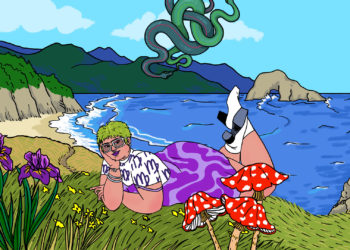A pro-Palestinian demonstration during the 82nd Venice International Film Festival on Saturday diverted attention from the starry event and turned it instead toward the humanitarian crisis in the Gaza Strip.
Thousands gathered on the Lido barrier island for a march from the Piazza Santa Maria Elisabetta toward the Palazzo del Cinema, where stars like Julia Roberts, George Clooney and Emma Stone have attended premieres this week.
“Today in the Lido di Venezia, there is one of the most important global events in cinema, where the richest people in the world are here to distract the masses from something we think is really much more important,” said Emilia d’Agnano, a Venice student holding a banner at the front of the march.
Among those protesting was Roberto Zibetti, an Italian actor who came to the festival as a cast member in three films, including the opening-night political drama “La Grazia.”
“It’s symbolically interesting to say that creativity can be an arsenal of peace,” said Zibetti, who added that on stage and screen, actors are counted on to speak emphatically.
“I’m happy to make louder the simple sentence of ‘Stop killing,’” he said.
Plans for the protest had gained momentum after Venice4Palestine, an organization of Italian and international film professionals, issued an open letter last weekend demanding that the festival condemn the destruction and suffering caused by Israel’s military campaign in Gaza.
“We — activists and workers in the film, media and news fields — believe that for once, the show must stop: We must interrupt the flow of indifference and open a path to awareness,” the letter read. “In Venice, all the spotlight will be on the film world: We all have a duty to amplify the stories and voices of those who are being massacred.”
The letter was signed by hundreds of actors, directors and producers, including Swann Arlaud, the French actor known for his role in “Anatomy of a Fall”; Charles Dance, the British actor and director who starred in “Game of Thrones”; and the Gaza-born directors Arab Nasser and Tarzan Nasser.
The Venice Biennale, which organizes the film festival, said in a statement that it had always been open to discussing global issues and pointed to films about the war in Gaza that were being screened at this year’s festival, or were last year.
Venice4Palestine had also urged the festival to withdraw its invitations to Gal Gadot and Gerard Butler, the stars of “In the Hand of Dante,” a film by the director Julian Schnabel that is scheduled to premiere at the festival next week.
A second letter from Venice4Palestine said that the actors had over the years “publicly exposed themselves in favor of the Netanyahu government, and in particular the Israeli army.”
Gadot, an Israel native, served in the country’s military for two years, as is mandatory for women, and Butler attended a 2018 gala in support of the Israeli military in Beverly Hills, Calif.
Alberto Barbera, the Venice Film Festival’s artistic director, told Variety this week that Gadot would not be attending, but he said at a news conference that the festival would not rescind invitations to artists over the war.
“If they want to be at the festival, they will be here,” he said.
Barbera reiterated the festival’s position over the conflict.
“We have never hesitated to clearly declare our huge sadness vis-à-vis what is happening in Gaza, in Palestine, the death of civilians and especially of children who are victims,” he said. “I think there are no doubts as regards the position of La Biennale on this.”
The war, which is now nearly two years old, has devastated Gaza’s civilian population.
In July, the enclave’s Health Ministry said that more than 39,000 people had been killed, a toll that does not distinguish between civilians and combatants. And this month, a group of global experts said that Gaza City and the surrounding territory were officially suffering from famine.
Derrick Bryson Taylor is a Times reporter covering breaking news in culture and the arts.
The post Pro-Palestinian Protesters Raise Gaza War at the Venice Film Festival appeared first on New York Times.




